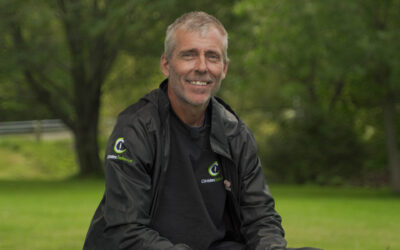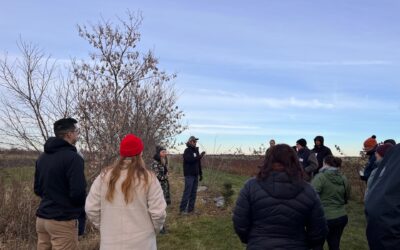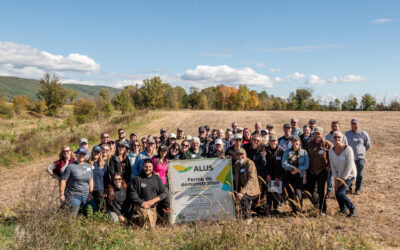An interview with Aldyen Donnelly as part of a series unraveling how investment in nature-based solutions delivers positive environmental, social and economic impacts, creating a better future for everyone.
Aldyen Donnelly joined ALUS and New Acre Project in 2022 as a carbon markets expert with the goal to expand carbon market strategies with Canada’s farmers and ranchers. She is working to create a robust carbon and ecosystem services accounting system for ALUS and to further New Acre Project market development vis a vis a bundled ecosystem credit. The co-founder and former director of carbon economics at Nori, a carbon removal marketplace launched in 2018, Aldyen brings 40 years of experience working on market-driven strategies to reduce atmospheric carbon concentrations.

Aldyen Donnelly
As the world grapples with climate change, Canada is uniquely positioned to tackle this crisis and offer global leadership in using nature-based solutions.
“We have an opportunity to show leadership in maximizing opportunities through nature to reach Canada’s goals to reduce emissions to at least 40 per cent below 2005 levels by 2030,” says Aldyen Donnelly, Head of Carbon Markets, ALUS and New Acre Project.
Estimates suggest that nature-based solutions can provide 37 per cent of the required greenhouse gas (GHG) emissions mitigation needed to meet global targets by 2030. This is according to research cited by the Canadian Council of the Academies (CCA). that are able to contribute significantly to nature-based solutions that would drive global GHG sequestration efforts.
Canada must maximize all opportunities available in the natural solution space, particularly in the agriculture sector. As the single largest group of private landowners in Canada, it makes sense to work with farmers and ranchers to seize the abundant opportunities for carbon mitigation on the rural landscape.
“Nature-based solutions keep water and air clean, support biodiversity and sequester carbon, all while building a more resilience landscape and food system,” Aldyen says.
Double the impact with nature-based solutions
When it comes to reducing the concentrations of heat-trapping gases in the atmosphere, Aldyen notes there is only one investment that provides both mitigation and adaptation.
This two-for-one opportunity, she says, can play a role in Canada’s targets for reducing GHG emissions. Nature United and CCA identify the potential to be approximately 70 million tonnes annually until 2030.
“It’s not reasonable to see nature-based solutions as optional,” Aldyen says. “If it was optional before, it’s not anymore, because the world has waited too long. Canada needs these if we are truly going to meet our goals.”
Shifting markets
The capacity of nature-based solutions is particularly meaningful to corporations. Leading market actors anticipate that governments and shareholders are going to demand they execute a massive shift in the definition of their core business, says Aldyen, comparing it to the transformation that has been occurring in the energy sector.
When this happens, corporations will look at options, including nature opportunities within their supply chain, she says. “For companies, particularly food and fibre producers, leveraging opportunities natural solutions in their supply chain will optimize their future business model, now. “It’s smart business,” says Aldyen.
Global leadership
Beyond Canada’s unique landmass and opportunities in agriculture, the country is well-positioned to demonstrate leadership in climate action, due to its role in addressing past earth systems challenges. In 1984, a small group of Canadians put forward a proposal called the Montreal Protocol to stop building a hole in the ozone layer. It was a critical moment in human history.
“By 1988, all of the major nations in the world had signed off on the Montreal Protocol. And by 2000, we had reduced ozone depleting substance releases to the atmosphere by enough that the hole was starting to shrink, and the holes virtually disappeared right now,” says Aldyen. “We spent 20 years in international meetings not getting anywhere. And then a small group of Canadians finally stepped in and showed the whole world the way to go.”
Canada’s current opportunity to embrace natural solutions for carbon reduction is “our generation’s Montreal Protocol moment,” she says.
“We know how to do this. Let’s do it again.”
See Our Results

SDGs

Biodiversity




